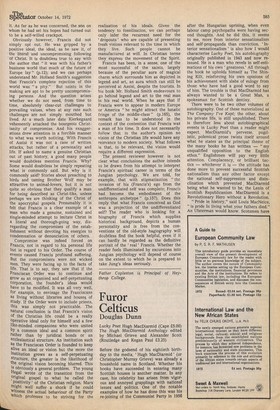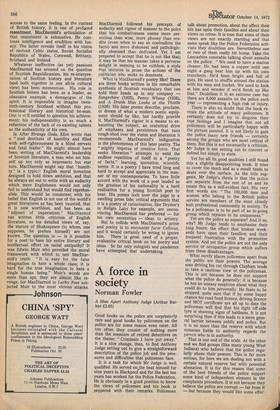Furor Celticus
Douglas Dunn
Lucky Poet Hugh MacDiarmid (Cape £5.00) The Hugh MacDiarmid Anthology edited by Michael Grieve and Alexander Scott (Routledge and Kegan Paul £3.25) Before the godsend of his eightieth birthday to the media, 'Hugh MacDiarmid ' (or Christopher Murray Grieve) was already a household name in Scotland. Whether his books have succeeded in entering many Scottish houses is another matter. In any case, his celebrity has arisen from vigorous and annoyed grapplings with national issues and politics. One of the notable examples of how he has done this was his re-joining of the Communist Party in 1956 after the Hungarian uprising, when even labour camp psychopaths were having second thoughts. And he did this, it seems to me, more from interior sensationalism and self-propaganda than conviction. 'Interior sensationalism' is also how I would characterise Lucky Poet, his autobiography originally published in 1943 and now reissued. He is a man who revels in self-estimations of his own 'greatness.' All through the book he upholds himself as The Shining Kilt, reinforcing his own opinions of his achievement with slabs of eulogy from those who have had a good word to say of him, The trouble is that MacDiarmid has always wanted to be a Great Man, a spokesman for Scottish destiny.
There were to be two other volumes of autobiography. One of these materialised as The Company I've Kept; the other, about his private life, is still unpublished. There is therefore less about autobiographical events in Lucky Poet than a reader might expect. MacDiarmid's perverse, pugilistic, polemical prose twists itself around what he states as the principal theme of the many books he has written — "my unqualified opposition to the English ethos." Englishmen will pay very little attention. Complacency, or brilliant tactics — whichever it is — the attitude has done more to prevent successful Scottish nationalism than any other factor except the national self-suppression and disinclination which prevented MacDiarmid being what he wanted to be, the Lenin of Scottish Republicanism. MacDiarmid is a Revolutionary Hero without a Revolution.
" Pride in history," said Louis MacNeice, "is pride In living what your fathers died." An Ulsterman would know. Scotsmen have access to the same feeling. In the context of British history, it is one of profOund resentment. MacDiarmid's articulation of that resentment is exhaustive. He combines intelligence and erudition with lunacy. The latter reveals itself in his vision of revived Celtic states, Soviet Socialist Republics of Wales, Cornwall, Brittany, Scotland and Ireland.
Whatever ineffective (as yet) passions MacDiarmid has aroused on the question of Scottish Republicanism, his re-interpretation of Scottish history and literature (and both together in one all-in cultural view) has been momentous. His role in Scottish letters has been as a leader, an obsessive example, a demagogue of the spirit. It is impossible to imagine twentieth-century Scotland without this professional literary and historical he-man. One is stil entitled to question his achievement; his indispensability is as much a reflection of the lack of co-existing talents as the authenticity of his own.
In After Strange Gods, Eliot wrote that a "soul destitute of humility and filled with self-righteousness is a blind servant and fatal leader." He might almost have been writing of MacDiarmid's leadership of Scottish literature, a man who set himself up not only as impresario but star turn. MacDiarmid might say that ' humility ' is a typical English moral invention designed to hold down ambition, and that he always set out to write with an audacity which mere Englishmen would not only fail to understand but would find reprehensible. This would be consistent with his belief that English is not one of the world's great literatures as has been vaunted, that it is now worthless, and has been an "adjunct of imperialism." MacDiarmid has written little criticism of English literature, so his detailed views of, say, the stature of Shakespeare (to whom, one supposes, he prefers himself) are not known. The question is — is it possible for a poet to base his entire literary and intellectual effort on racial antipathy? It was Edwin Muir who provided the moral framework with which to test MacDiarmid's truth: " It is easy for the false imagination to hate a whole class; it is hard for the true imagination to hate a single human being." Muir's words are more than apt; they are almost like revenge, for MacDiarmid in Lucky Poet subjected Muir to the most vicious attacks. MacDiarmid followed his precepts of audacity and vigour of manner to the point that his combativeness seems more pernicious than wise, more phoney than erudite (even when to say so contradicts the facts) and more dishonest and pathologically obsessed than dedicated. Yet I am prepared to accept that he is not like that; it may be that his manner takes a perverse delight in seeming to be ruthless, a style that imitates in prose the actions of the politician who seeks to dominate.
What is MacDiarmid's poetry like? There are three books written in his remarkable synthesis of Scottish vocabulary that can hold their heads up in any company — Sangschaw (1925), Penny Wheep (1926), and A Drunk Man Looks at the Thistle (1926). His later poems describe, proclaim, or dream of what a modern poetic equipment should be like, but hardly provide it. MacDiarmid's vigour is a means to exhausting the subject, an oratorical drive of emphases and persistence that runs rough-shod over the vision and liberation it recommends. MacDiarmid's indignation is the phenomenon of this later poetry. The "mighty impetus of creative force. That seeks liberation" attempts to weld the endless repetition of itself in a "poetry of facts," learning, quotation, scientific terms. It is a poetry I have tried long and hard to accept and appreciate in the manner of my contemporaries. To have little accord with the work of a poet lauded as the greatest of his nationality is a hard realisation for a young Scottish poet to bear. His poems inch over the page in a swelling prose tide; critical arguments that it is a poetry of ratiocination, like Dryden's in Religio Laici for example, are unconvincing. MacDiarmid has preferred — for his own necessities — ideas to artistry.
But to collide with MacDiarmid's prose and poetry is to encounter furor Celticus, and it would certainly be wrong to ignore him. There is great need of a proper, evaluative critical book on his poetry and ideas. So far only eulogists and panderers have attempted that undertaking.















































 Previous page
Previous page